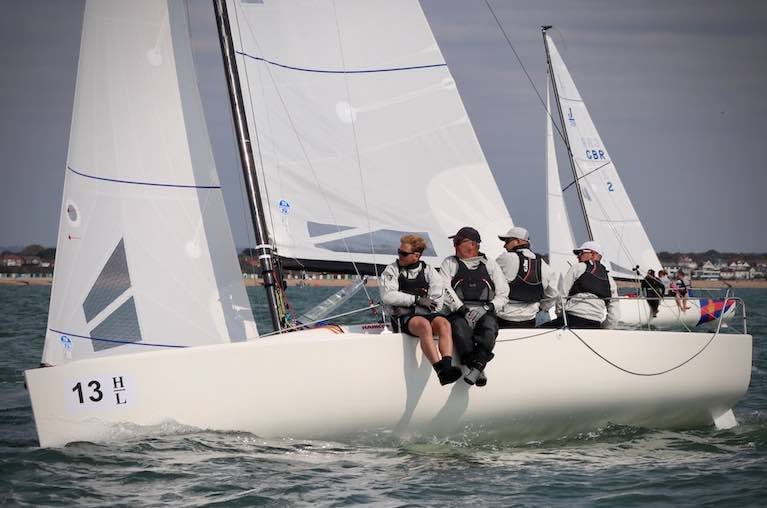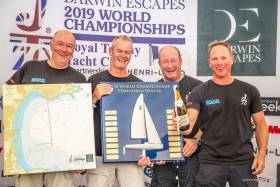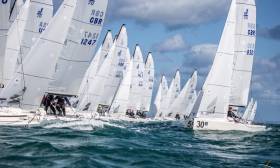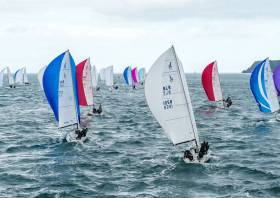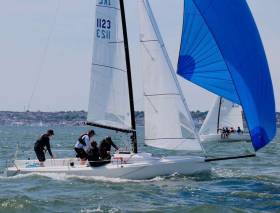Displaying items by tag: Marshall King
The J/70 UK Grand Slam Series is off and running with seven windward-leeward races over two days of tight racing right through the 16-boat J/70 fleet. The Warsash Spring Championship was the venue, expertly hosted by the Warsash Sailing Club. There was close racing right through the J/70s with highly competitive starts, mark rounding and plenty of duels from front to back.
Martin Dent’s Jelvis scored no worse than a fourth place to win Grand Slam #1 in the Open Class by three points from Charles Thompson’s Brutus, helmed by Sam Carter. Doug Struth’s DSP, helmed by Tom Mallindine, was the winner of the Corinthian Class by a single point from Johnathon Calascione's Calypso with Royal St. George's Marshall King of Dun Laoghaire driving.
J/70 UK Grand Slam Round 1 – Full Results downloadable below.
Jelvis and Brutus were level on points going into the last race, Jelvis won Race 7 to clinch the championship. Jelvis is very much a family boat with Martin Dent driving, daughter Ruby on the bow and the Wetherell brothers Jack and Henry on trim.
“Well, that was yet another weekend of absolutely sick racing and no doubt that the best racing in the Solent was in the J/70s,” commented Martin Dent. “Warsash Race Committee gave us 7 excellent races, courses and start lines were just as good. The J/70 Class is getting stronger every year, with new teams joining and with the standard of all teams rising, making the races nip and tuck all the way to the end. We went into the final race level points with Brutus and had to get everything right to beat them. Jelvis team has been working hard for a few years now, and so to get the win this weekend was just reward.”
Charles Thompson’s Brutus commented. “We got a bad start in the last race and that is all it takes in this fleet; we were 13th at the top mark and had to fight tooth and nail to get back up to fourth. The Grand Slam Series decides which teams will qualify for the 2024 J/7World Championship and the only other route in is top five at the 2022 Europeans. It is such a competitive class to race in, and well done Jelvis, but may the best team win the next round!”
At the start of the second day of the regatta, Doug Struth’s DSP was level on points with Calypso. DSP had a shocker in Race 5 this morning scoring a 10th. However, DSP fought back to overhaul Calypso in the very last race to win the Corinthian Class by a single point and place third in the Open Class.
“Really close racing, especially with Calypso, and there were battles going on right through the fleet,” commented Doug Struth. “The team have been training prior to the regatta with Elliott Willis, and also the J/70 Training Regatta last weekend. It really helped to get us off to a great start, and I am looking forward to the next one!”
Third in the Corinthian Class was Max Clapp’s Jeepster, the team are all 25 and under. Namely, Horatio Sykes, Miles Jones, Max Clapp, and Mathieu Cadei.
“On the first day we had to retire from the second race, as we lost the kite halyard up the rig,” admitted Max Clapp. “We lowered the main and used that halyard to put Mathieu up the rig, to get us racing. We are a young team that has really only just come together, so we have a lot to learn but we are delighted with the result from this regatta, and we hope to improve for the next one.”
The J/70 UK Fleet is packed with passionate sailors and the spirit and atmosphere is just as important as the electric racing. On the Saturday of the Championships, all teams, friends and family, were invited to a curry and beers night at the Royal Southern Yacht Club. Dedicated amateur sailors rubbed shoulders with Olympic medallist in a fun and friendly environment.
Royal St. George's Marshall King Fighting to Defend J70 UK National Title on the Solent
Dublin Bay and Greystones sailor Marshall King of the Royal St. George Yacht Club, who is the corinthian World Champion in the J70 class, has some work to do in the Class's British National Championships if he is to move up from sixth in IRL 1123 'Soak Racing' to retain the national title in the final three races on the Solent today.
The Solent is a tricky place to sail, especially when the wind is all over the place. Uber wind shifts postponed the start of the second day of the J/70 UK National Championships, but once the wind direction stabilized, three windward leeward races were hard fought for the 22-strong fleet. Paul Ward’s Eat Sleep J Repeat took a brace of bullets to lead the regatta by two points. Graham Clapp’s Jeepster scored a 1-2-1 to move up to second. Martin Dent’s Jelvis drops to third but is still in with a shot at the title going into the final day.
 22 teams are competing for the 2020 J/70 National Championships Photo: Louay Habib
22 teams are competing for the 2020 J/70 National Championships Photo: Louay Habib
Eat Sleep J Repeat’s Ruairidh Scott is a World Champion in the J/70, J/80 and J/111 classes, and commented after racing: “It wasn’t easy in a competitive fleet, especially upwind when the chop gets going, it is challenging to keep the speed up. Crew weight, technique and also mast rake has a big influence on performance. This fleet is spirited and upwind there is not a lot in it. However, the first downwind leg today, we were the first boat to go into wing-on-wing, and that got us away.”
Ben Saxton, NACRA 17 World Champion, has been racing in the J/70 Class for four years, Ben is part of Graham Clapp’s crew on Jeepster. “To win in the J/70 Class, you need good teamwork,” commented Saxton. “If you start well and you are quick enough, then you can bring your tactics into play. We are pretty stacked for weight, so quick upwind but not as fast downwind. We have been working on downwind technique and we are getting faster, which shows in the results. We have worked hard to get it right and we passed Eat Sleep upwind today for our win, so that was a good feeling.”
Tales from the J70 Peloton
Patrick Liardet’s Cosmic is currently lying in 12th position with a crew of young talented sailors including; son Freddie, Jack Hanslope and Richard Anderton. On the racecourse and in the results, Cosmic is mixing it with sailors from the Olympics, World Champions and top professional sailors.
“It is the first time we have all sailed together and mixing it up in the fleet has been good fun,” commented Patrick. “This is a very tough fleet with strong sailors, and it’s tremendous. Richard is a World Champion Fireball crew, Freddie is very strong in dinghies and keelboats and Jack is his friend from Uni’ who is a great team racer. The boats are evenly matched, so you are really fighting for every place, all the way down the fleet.”
Racing at the J/70 UK National Championship concludes Sunday 13th September with three races scheduled in The Solent.
Results here
Greystones Sailor Marshall King Becomes J/70 Corinthian World Champion
Greystones helmsman Marshall King from County Wicklow but who lives in the UK has won the J/70 Corinthian World Championship in dramatic style on Soak Racing yesterday. In the last race, Soak Racing was four places ahead of Doug Struth (GBR) racing DSP. A tie on points for the series was settled by countback, a single place after 14 races gave Soak Racing victory. Denis Cherevatenko (RUS) racing Joyfull was third. Fiona Hampshire (GBR) racing Elizabeth was best Corinthian Woman Helm in the championship.
“Amazing, we have been trying to win this for six years, so it feels just amazing. Torbay has been exceptionally tricky, and we have had great competition at a really well-organised regatta, and it is great to come away with the win. Today's racing was really exciting, we were 10 points behind DSP going into the last two races. We had an excellent Race 13 and then it was about staying with DSP and making sure there were not too many boats between us. It all came down to the last 100 metres, and we did just enough.”
The Darwin Escapes 2019 J/70 World Championships Awards Ceremony was held in the Event Marquee. Event Director Bob Penfold introduced Admiral of the Royal Torbay Yacht Club, Nigel Wollen to present the prizes and winners trophies. Darwin Escapes Chief Executive Anthony Esse described the event as a “complete triumph” and showing gratitude to Bob Penfold generously announced a free holiday at Darwin Escapes for Bob and his wife Sue. GAC Pindar represented by Andrew Pindar, who has been sponsoring sailing events for 39 years, was also invited to the stage and was full of praise for an amazing regatta.
The Royal Torbay Yacht Club and their dedicated volunteer support were roundly applauded by all of the J/70 sailors for producing a fantastic regatta. Stuart Childerley and the Race Management team received huge applause for providing high-quality race courses in tricky conditions.
Wilson & King Take Corinthian Lead On Third Day Of J/70 Worlds
Marshall King and Ian Wilson’s Soak Racing was the new leader in the Corinthian class after posting 2-34-9 yesterday (Wednesday 4 September) in the Darwin Escapes 2019 J/70 World Championship, writes Louay Habib.
The Greystones-linked pair’s performance saw Doug Struth (GBR), racing DSP, drop to second in the standings. Denis Cherevatenko (RUS) racing Joyfull retains third but is under pressure from a top performance today by Charles Thompson (GBR) in Brutus.
“It is really difficult to track the boats in the Corinthian fleet because we are all out on one race course and we are racing against the pros and we can give them a really good run for their money but we do keep an eye out for our mates from Hamble, DSP, if we are in front of them, we know we are doing well,” said Ian Wilson, who is also J/70 international class president.
“It was brilliant today, blowing 20 knots, wind all over the place, a great day out with boats hooning all over the place – just great fun. We are hoping for more of the same tomorrow, big breeze and great racing in Tor Bay.”
Indeed, the breeze piping in from the north created full-on battle conditions for the 20 nation fleet on Wednesday, and for the third consecutive day both the Corinthian and Open leaders have changed.
In the Open class, Paul Ward (GBR) and Eat, Sleep, J, Repeat scored a 1-4-15 to take the overall lead, and Pichu Torcida (ESP) racing Noticia has climbed to second after scoring a 5-17-6.
Joel Ronning (USA) racing Catapult, dropped to third after scoring 14-14-10., while yesterday’s leader Alberto Rossi (ITA), racing Enfant Terrible, started the day well posting 9-8 but a 28 in the last race after broaching out drops Enfant Terrible to fourth.
Teams from nine nations occupy the top 10 places after a day that also race wins for Henry Brauer (USA) on Rascal, and Carlo Alberini (ITA) racing Calvi Network.
Marshall King from Greystones and Ian Wilson’s Soak Racing followed up their Corinthian UK National title win at Royal Torbay last week with a strong start in the Darwin Escapes 2019 J/70 World Championship at the same venue, writes Louay Habib.
The event kicked off yesterday (Monday 2 September) with three races in Torbay, where big wind shifts and changes in wind speed tested the 78 teams competing as well as the race management team led by Stuart Childerley.
In the Corinthian class, Patrick Liardet (GBR) racing Cosmic ended the day leading by just one point from Doug Struth (GBR) racing DSP.
Wilson & King (IRL) completed a trio of British Isles boats leading the championship for the Corinthian title. There were also race wins for Pichu Torcida (ESP) racing Noticia, Reg Lord (AUS) racing Juno, and Nelson Mettraux (SUI) racing CER Aprotec–Ville de Genève.
In the Open class, Joel Ronning (USA) racing Catapult, led the championship after three races. Second was Claudia Rossi (ITA) racing Petite Terrible, which recovered from a 28th place in Race 1 to post two podium finishes. Andrey Malygin (RUS) racing Maria was third.
Greystones Sailor Marshall King Wins UK J/70 Southern Area Championship at Royal Thames
Eight races were held in champagne conditions for 18 J/70 teams in The Solent. Bright sunshine and a huge range of wind conditions provided spectacular racing with fun-filled social events all organised by the Royal Thames Yacht Club. 2017 UK National Champions, Ian Wilson & County Wicklow's Marshall King in Soak Racing scored all podium finishes including five bullets to win the regatta and lift the Myosotis Cutter Cup.
“To be honest, the results flattered us,” commented Ian Wilson. “The J/70 UK fleet are getting faster and smarter, which is great to see. I think it is very important for the leading UK teams to race in the Solent because it does bring on the competition, and that pushes everybody on for a better performance. The Royal Thames event is a great won to win because it means you go to the their end of season prize giving, it took me two days to recover after the last one!”
In second place was John Greenland's Jdog, flying the colours of the Royal Thames, the team was racing one of the J/70s owned by the RTYC, four of which are available for charter. Despite not winning a race, Greenland's team was only out of the top five in one race during the eight race series.
Graham Clapp's Jeepster representing the Royal Southern YC started the regatta with a bullet and went on to score two more podium finishes, and no worse than eighth in the series resulted in third for the regatta.
In addition to the top three teams, six more teams made the race podium during the regatta: Niklas Zennstrom's Rán, Joshua Flack's Elizabeth, Patrick Liardet's Cosmic, Simon Cavey's Just4Play, Tara Gill-Taylor's RTYC Academy, and Phil Rys' Bryn.
The 2019 J/70 UK Grand Slam Series continues 18-20 July with Round 5,the J/70 UK Class Training Event, organised by the Royal Southern Yacht Club. Early entry fee applies until July 15, 2019. For more information: https://yachtscoring.com/emenu.cfm?eid=9454


























